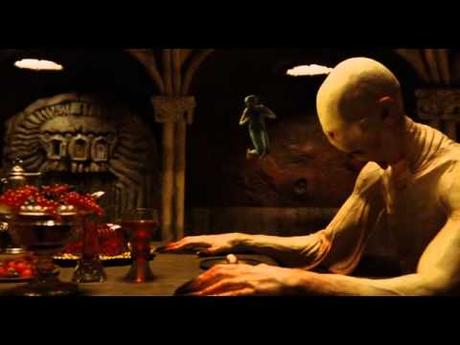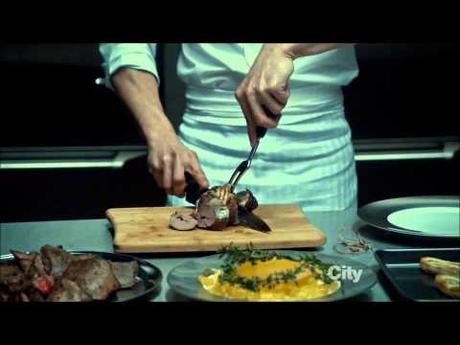A feast differs from a dinner, or even a well-executed banquet, in its embrace of excess. More, more. Of course, that's what makes feasts intriguing: Excess leads to indulgence, and indulgence potentially contributes to a relaxing of morals. Diminished morality tends toward imprudent decision-making. There is more than simple celebration beneath the surface of most fictional feasts.
In the 1960s, the Rolling Stones tried to define themselves as the dangerous alternative to the rollicking Beatles-so it's not surprising a Romanesque feast hinting at a possible orgy later on makes for one of their best photo ops ever: The overwrought gatefold-album interior photo of Beggar's Banquet, contrasting to the cover's simple invitation. It's an evocative scene to contemplate when listening to one of the five-starriest of the band's five-star albums.
What makes the feast a great photo for the album that kicks off with "Sympathy For The Devil" and contains "Stray Cat Blues" is it feels soaked in carefree sin. It also looks as if, for Bill Wyman and Charlie Watts, the fun part is over and they're a little weary of it all, while Mick Jagger, Keith Richards, and Brian Jones might still be up for some misbehavior. That sums up the spirit of 1968 about as well as any History Channel show.
Historically, a lot of truly bad stuff goes down at fictional feasts, from Banquo dropping in to freak out Macbeth to the Red Wedding, George R.R. Martin's test to determine whether you're really tough enough to be a Game Of Thrones fan.
So much unexpected horror. So much tragedy. So much disappointment and grotesque behavior, violating the spirit of a generous meal presented with lovely intentions. Of course, in some cases, a feast is laid with the intent to trap. The tactic of dragging surviving tributes of the 74th Annual Hunger Games out of the woods, to force confrontation, then calling it a "feast" is an insult to feasts-although the spread still functions as such when Katniss opens her backpack to find crackers, dried beef strips, an empty black water bottle, and supplies.
But the trap can be beautiful: A fairy-tale faun in Pan's Labyrinth warns young Ofelia not to eat what the Pale Man has laid out on his welcoming table, and her flying fairy comrades are determined to prevent her from taking anything, but she's disobedient. It is tempting: The child-eating Pale Man seems oblivious; Ofelia has free will and chutzpah, and even viewers feel for just a tiny moment that the ogre might not notice her silently eating a couple grapes. (Every feast since Roman times has to have grapes.)

Other feasts, rather than a celebration or simple trap, are horror shows staged to punish someone, often involving a little surprise anthropophagical action-Dr. Frank-N-Furter punishes his servant Columbia for her wandering eye with a horrifying feast of Meat Loaf in The Rocky Horror Picture Show, and it's only because it's well-deserved revenge served to a miserable villain that we can feel both disgust and satisfaction at the nature of the feast at the end of The Cook, The Thief, His Wife, And Her Lover. Laying a generous table with at least a little human flesh as a way of punishing someone is a theme that stretches from the pie of Titus Andronicus to the works of Eli Roth.
These feasts are as punishing as it gets, for the characters and the audience, yet we can occasionally begin to understand the revenge motive. Also, there's the many tales of a cannibal-by-necessity feasting to survive, which nobody wants to imagine but, again, is sort of understandable-though there's plenty of villainy in Ravenous, Jeffrey Jones' character at least seems pragmatic when he says with a shrug, "There's no guilt-I gotta eat." But slipping a little human meat into the feast just because it's possible, or just because you personally like it, and you're amused by what you can get by with-that's much more complicated.
Nowhere you find the topic of remorseless feasting on humans so thoroughly examined as in the many stories centering around everyone's favorite cannibal, Hannibal. In fact, it may partly be the doctor's opaque attitude toward whether or not the person being served-on either side of the fork-truly deserves such an awful punishment that makes Dr. Lecter endlessly fascinating (or, at least, endlessly fascinating to those who aren't in charge of renewing his show). Certainly some of his victims deserve something awful to happen to them; but Hannibal's no Dexter. He's charming. He's erudite. And Hannibal certainly, almost more than anyone in fiction, knows his way around prepping and plating a feast and then, with supremely smug private humor, thoughtfully cautioning his guests, "Before we begin, you must all be warned-nothing here is vegetarian."

If there's anyone in cinema who can challenge Hannibal at basic feast presentation, it's either the brothers in Big Night, or Babette, French housekeeper to two stern, pious Danish spinsters. Babette's Feast shows what happens if a capable person like Babette-denied the pleasures of preparing and enjoying a lavish, carefully orchestrated feast for years-wins the lottery and decides that sharing a few moments of culinary transcendence would be better than spending the money selfishly.

Though the conservative Danish townsfolk intend to restrain themselves, a feast-driven release toward loosened morals affects them as much as exposure to sheer excess ended up affecting Brian Jones of the Rolling Stones-only in Babette's Feast, the results are strictly positive. The care Babette displays preparing the food gives it a kind of blessed protection from the sin mere indulgence might trigger: French cuisine's reputation as an earthly delight and, really, a concession to the appetites and sensual aspects of our nature, is balanced by high expectations. Considered art by many and judged severely by those with refined standards, the discipline and skill required to prepare a French dish as it should be prepared are frequently depicted as redemptive-from Ratatouille to Julia & Julia to Babette's Denmark villagers and the gifted protagonist of The Hundred Foot Journey.
And Babette's generosity is also redemptive. Lavishness is, of course, the key to any feast, but generosity can come from both sides of the table. After the dog protagonist of Disney's Oscar-anointed short film Feast bonds with his master over gourmand-like meals of junky food, he's frustrated by the restraint and less than feast-worthy health food introduced by a new girlfriend. Once the dog shows thoughtfulness and generosity himself, returning her parsley garnish after the master and girlfriend break up, everything resolves-and a true feast of spilled baby food begins a few months later.
That's the key to the spirit of a successful feast-everyone has to have the right attitude, or at least the same attitude. It doesn't matter what the food is. In fact, the spirit of a feast might not mean everyone eats, if everyone gets out of it what they need.
In a hot, soul-crushing prison camp, Cool Hand Luke senses that the best way to help his fellow inmates is to stage a diversion-so he declares, whimsically, " I can eat 50 eggs!" Suddenly the prisoners are focused on whether that's even possible and start betting on his egg-eating capacity. As Luke feasts on hard-boiled eggs for an hour, the prisoners are riveted. And weirdly, for several minutes, so are we. Luke manages with those eggs to bring everyone together, people of all opinions and allegiances and preferences and backgrounds, and furnish them a celebration of the spirit of living life fully on one's own terms. That he's the only one eating is detail.
More, more, more: It's the defining feature of a feast. As long as it doesn't slide into mere decadence, disobedience, and self-indulgence, generosity can render everybody who's at the table as satisfied as Babette's Danish folk, as engaged as Luke's fellow inmates-or as simply, warmly, and innocently celebratory as the Whos of Whoville when they let the monstrous Grinch carve their roast beast. That's the spirit. As long as you're sure that roast beast isn't somebody you used to know.
Upcoming: A complete and total barf-o-rama
